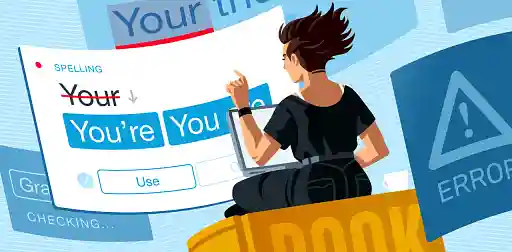Last updated on Oct 15, 2025
49 Places to Find a Critique Circle to Improve Your Writing
Martin Cavannagh
Head of Content at Reedsy, Martin has spent over eight years helping writers turn their ambitions into reality. As a voice in the indie publishing space, he has written for a number of outlets and spoken at conferences, including the 2024 Writers Summit at the London Book Fair.
View profile →Contrary to popular belief, writers aren’t solitary creatures by default. In fact, we’re often better when we write together, swapping trade secrets and exchanging manuscripts for mutual critique. Unfortunately, accidents of geography can stop us from congregating as often as we’d like. We don’t all live in literary hubs like London and NYC, so finding a critique circle in real life can be a bit of a challenge.
Luckily, you don’t have to be limited by the vagaries of place: there are plenty of online spaces where you can find writing partners (and their excellent tips). From the Critique Circle — the internet’s most famous writing group — to the more intimate critique groups studding the netscape, it’s easy enough to find gimlet-eyed readers ready to bring out the potential in your works-in-progress.
We’ve rounded 49 places to get feedback on your work. General writing critique groups are at the top, and genre-focused communities at the bottom. Because, to paraphrase the Starks of Winterfell, if the lone wolf dies while the pack survives, the lone writer struggles while the critique circle thrives.

GENERAL CRITIQUE GROUPS
1. Critique Circle
Most of this list is in alphabetical order, but Critique Circle is so well-known it’s worth breaking the mold. This Iceland-based community has a no-frills aesthetic. But since it opened in 2003, it’s offered more than 700,000 critiques for over 140,000 stories. Members sign up for free and earn credits — needed to put their work up for review — by offering feedback to other users. Every 3 reviews earns you enough credits to “buy” an opportunity to post.
Freshly enrolled writers have their work scheduled in a Newbie Queue, which sends their writing out for feedback faster than the regular queue. Word to the wise: the quality of feedback can vary — especially if they come from newbie members still learning the art of constructive criticism. But experienced members stand by to help to newbies as they get comfortable with the process.
Perfect if: You want to check out the internet’s most famous critique group
2. Reedsy Writing Prompts Contest
Yes, this one is facilitated through our very site! Here at Reedsy, we host a weekly writing contest where writers are invited to submit a short story based on one of our writing prompts. Shortly after launching this contest, we noticed a cool thing happening: writers started leaving constructive criticism and feedback on one another's stories — completely unprompted. We decided we wanted to encourage this initiative, so we created a critique circle within the contest.
Here's how it works: sign up for a free Reedsy Prompts account, and submit a short story to one of our contests. Once the contest ends, you'll receive an email asking you to leave feedback on other participants' stories — and the other entrants will likewise be encouraged to leave feedback on your story.
Perfect if: You want the opportunity to earn cash prizes as part of your critique circle experience
3. 10 Minute Novelists Facebook Group
This support group for time-crunched writers runs a weekly #BuddyDay thread every Tuesday, where members can post their work for review. Excerpts are fair game, as are blurbs, author bios, cover art, and the like. If you’d like to test drive a couple of different packages for your indie masterpiece, #BuddyDay might be a good place to start.
Even if it’s not Tuesday, 10 Minute Novelists is a great place to “hang out.” Members commiserate about how real life gets in the way of your literary dreams — and encourage each other to stick it out anyway.
Perfect if: You know you’ve got a novel inside you, but you can’t seem to carve out more than 10 minutes a day to actually write it
4. ABCTales
This free writing community lets members post their own work and comment on each others’ — think WattPad, with way less emphasis on One Direction fanfic. Discussion seems to revolve around how to write a poem to best effect, although some short story writers frequent the forums as well. The feedback tends to be earnest and encouraging. Members happily dole out congratulations at one another’s literary triumphs.
ABCTales emphasizes slow and steady writerly development more than hustling for bylines. The pieces posted on its forums likely won’t be eligible for publication at many mainstream outlets, so they tend to be exercises written for practice, or from sheer love of the craft. That said, there is a forum full of writers swapping tips for publication.
Perfect if: You want a wholesome community to help you hone your craft in a low-stakes way
5. Absolute Write Water Cooler
This sprawling writers’ forum can be a bit of a maze, but there’s a wealth of material to help you along on your writing journey. If you’re in search of critique, you’ll want to make your way to the Beta Readers, Mentors, and Writing Buddies board. It works a little like a craft-focused version of the old Craigslist Personals section. Just post a description of the piece you’re working on, and forum members who fancy giving it a beta read will get in touch.
While you’re waiting for your perfect beta reader to respond to your post, you can hang out on any of Absolute Write’s other craft-focused message boards. Many are genre-specific: check out Now We’re Cookin’! if you’re into food writing, or Flash Fiction if you’re a fan of pith.
Perfect if: You harbor romantic fantasies of finding your One True Reader on a personals site
6. Christopher Fielden
Christopher Fielden’s website offers tons of free resources – ranging from how to do research, how to keep your creativity fresh, and advice about self-publishing. He also curates a list of writing competitions – whether you’re looking to submit a short story or a poem, there are tons of options to choose from. You can pay for a critique from his team as well and a seasoned writer like Dr. Lynda Nash or Allen Ashley will go over your short story, novel, or poem.
7. Beta Readers and Critique Partners Facebook Group
This Facebook group has been helping writers find beta readers for two years now, and it’s still going strong. Almost 500 new members joined in the last month, bringing the total up to over 7,000. Rest assured, the mods won’t tolerate any nonsense: scorched earth critiques are forbidden, and members are encouraged to be kind at all times.
The Beta Readers and Critique Partners group welcomes members of all skill levels. Participants do their best to keep in mind whether they’re reading a seasoned pro, or someone just getting started as a beta reader. Self-promotion is banned, so don’t worry about being spammed.
Perfect if: You want a group where newbies can freely mingle with seasoned pros
8. Critique It
This peer review tool works like Google Docs on steroids: a group of collaborators can work on the same project, leave each other feedback, and feel like they’re all gathered around the same desk even if they’re actually scattered across the globe. Unlike GDocs, Critique It makes it easy to drop in video and audio files as well. That way, critics can leave their feedback in whatever format they like.
It won’t actually help you find a critique group. But it will let you form one with whoever you choose — no matter where in the world they’re based.
Perfect if: You want to form a writing group with friends from afar
9. The Desk Drawer
Here’s a critique group with high standards: send out multiple submissions that haven’t been spell-checked, and the group just might kick you out. This ultra-active, email-based workshop is a perfect fit for the kind of scribblers who thrive off prompts — and who want to use them to hone their craft in the (virtual) company of fifty-odd like-minded writers. Every week, The Desk Drawer sends out a writing exercise. Members can respond directly to the prompt with a SUB (submission) — or offer a CRIT (critique) of another writer’s response.
To stay on the mailing list, workshoppers have to send out at least three posts a month: 1 SUB and 2 CRITS, or 3 CRITS. And membership is selective: if you’d like to join, you’ll have to send in a short, 100- to 250-word writing sample based on a prompt.
Perfect if: You want some disciplined — but mutually encouraging — writing buddies to keep you honest as you build up a writing habit
10. Fiction Writers Global Facebook Group
Despite its name, this community welcomes writers of fiction and non-fiction alike, although those who work specialize in erotica are encouraged to find an alternative group. At 13 years old, it’s one of the longer-running writing communities on Facebook. The mods have laid down the law to ensure it continues to run smoothly: fundraising, self-promotion, and even memes are strictly banned.
If you’re still weighing the pros and cons of traditional versus self-publishing, Fiction Writers Global might be the perfect group for you. They have members going both these routes who are always happy to share their experiences.
Perfect if: You’re determined to go the indie route — or thinking seriously about it
11. Hatrack River Writers Workshop
This 18+, members-only workshop was founded by renowned speculative fiction writer Orson Scott Card, of Ender’s Game fame, and it’s now hosted by short fiction writer Kathleen Dalton Woodbury. Both these writers cut their teeth on genre fiction, but don’t feel limited to tales of magic and spacefaring — anything goes, except for fanfic.
At the Hatrack River Writers Workshop, members can submit the first 13 lines of a WIP for review — an exercise designed to make sure the story hooks the reader as efficiently as possible. A loosely structured Writing Class forum offers prompts, called “assignments,” designed to help blocked writers start (or finish) stalled works.
Perfect if: You want to polish your story’s opening to a mirror-shine
12. Inked Voices
Unlike the cozy, Web 1.0 vibes of older online critique groups, Inked Voices is as sleek as they come, with cloud-based functionality and an elegant visual brand. Its polished look and feel make sense considering this isn’t so much a writing group as a platform for finding — or creating — writing groups, complete with a shiny workshopping app that has version control and calendar notifications built in.
Each workshop is private, invite-only, and capped at 8 members. You can sign up for a two-week free trial, but after that, the service costs $10 per month, or $75 for the year. Membership also lets you tune in for free to lectures by industry pros.
Perfect if: You’re willing to pay for an intimate, yet high-tech, workshop experience
Hire a pro editor on Reedsy
Sarah K.
Available to hire
I'm a British Asian Cambridge-educated editor and author with over 20 years experience in publishing.
Paul H.
Available to hire
I have a PhD in philosophy and two decades' experience in editing humanities manuscripts for university presses and independent authors!
Hilari C.
Available to hire
I am a sharp-eyed, award winning editor with over thirty years in the romance industry. I'll help you tell your story and find your readers!
13. Litopia
This website calls itself the “oldest writers’ colony on the ‘net,” a description that probably proves its age. One of its main draws? The writing groups that allow members to post their WIPs for peer review. The community tends to be friendly and mutually encouraging — probably the reason Litopia has lasted so long.
There’s another major draw: every Sunday, literary agent Peter Cox reviews several 700-word excerpts from members work on-air, in a podcast called Pop-Up Submissions. Cox tackles this process with a rotating cast of industry professionals as his guests. They’ve even been known to ask for a synopsis from a writer who impresses. Find more literary agents like Peter Cox here.
Perfect if: You’ve always wanted to spend some time in a writer’s colony, but you can’t jet off to Eureka Springs just yet
14. My Writers Circle
This easy-going discussion forum is light on dues and regulations, but members seem to be friendly and respectful anyway. A stickied thread on the Welcome Board encourages new members to read and comment on at least 3 pieces of writing before posting their own work for review. But this isn’t the kind of hard-and-fast rule that’ll lead to banning if you fall short. Members go along with it because they genuinely care about one another’s writing progress.
My Writers Circle has three dedicated workshop boards that allow forum users to seek feedback on their writing. One, called Review My Work, accepts general fiction and nonfiction, while additional spaces allow poets and dramatists of all kinds to get their verse, plays, and TV scripts critiqued.
Perfect if: You want a community where people are nice because they want to be — not because they have to be
15. Nathan Bransford - The Forums
Nathan Bransford worked as an agent before he switched over to the other side of the submissions process. Now, he’s a published middle-grade novelist and the author of a well-rated, self-published craft book called How to Write a Novel. In the midst of all his success, Bransford gives back to the literary community by running his ultra-popular Forums.
A board called Connect With a Critique Partner functions as matchmaker central for writers seeking their perfect beta readers. And if you’re not looking for something long-term, there’s the Excerpts forum, where you can post a bit of your WIP for quick hit of feedback.
Perfect if: You want to be part of a writing community that’s uber-active, but low-key
16. The Next Big Writer
Since 2005, this cult-favorite workshop has provided thousands of writers with a friendly forum for exchanging critiques. The site boasts an innovative points system designed to guarantee substantive, actionable feedback. To gain access, you’ll have to pay: $8.95 a month, $21.95 a quarter, or $69.95 for the whole year. Fortunately, there’s an opportunity to try before you buy: a 7-day free trial lets you get a taste of what the site has to offer.
The Next Big Writer also hosts periodic contests: grand prize winners receive $600 and professional critiques, while runners-up stand to gain $150 and 3 months of free membership. Meanwhile, all entrants get feedback on their submissions.
Perfect if: You like the sound of a members’ only writing contest with big prizes — in both cash and critique
17. NovelPro
This fiction writing workshop is one of the more costly online communities to join. But it has the rigor of an MFA program, at a tiny fraction of the price. Members — their numbers are capped at 50 — pay $120 a year. And that’s after a stringent application process requiring the first and last chapters of a finished, 60,000-word fiction manuscript and a 250-word blurb. Think of it as a bootcamp for your novel.
Even if an applicant’s writing sample passes muster, they still might not make the cut — there’s also a critique exercise that asks them to pass judgment on a sample novel chapter, with a 2-day turnaround. No wonder prospective NovelPro members are urged to reconsider unless their prose is “accomplished” and their fiction skills “advanced.”
Perfect if: You want a critique group that’ll take your work as seriously as you do
Free course: Novel Revision
Finished with your first draft? Plan and execute a powerful rewrite with this online course from the editors behind #RevPit. Get started now.
18. Prolitfic
Launched by University of Texas students frustrated by the vagaries of the publishing process, this slick, Gen Z-friendly site encourages emerging writers to help each other out with thorough, actionable reviews. Members critique one another’s critiques — dare we call it metacritique? — to keep the quality of feedback high.
Prolitfic's rating rubric, which assigns all submissions a star rating out of 5, insures that all reviewers are coming from the same place. Reviewers with higher levels of Spark, or site engagement, have their feedback weighted more heavily when the site calculates each submission’s overall rating.
Perfect if: You’re a serious, young writer hoping to find support in a tight-knit community built by your peers
19. Scribophile
One of the best-known writing communities on the web, Scribophile promises 3 insightful critiques for every piece of work you submit. Members earn the right to receive critiques by stocking up on karma points, which they can get by offering feedback on other works. You can get extra karma points by reacting to other users’ critiques — by clicking on Facebook-like buttons that say “thorough,” “constructive,” and the like — and by having your critiques showered with positive reactions.
A free membership lets you put two 3,000-word pieces up for critique, while premium memberships won’t throttle your output — but will cost you either $9 per month or $65 for the year.
Perfect if: You’d like to play with a critique system that has shades of Reddit — but far more civil!
20. SheWrites Groups
This long-standing community for writing women boasts a treasure trove of craft-focused articles. But the site also hosts a wealth of writing groups, split into genres and topics. Whether they work on screenplays, horror novels, or depictions of the environment, women writers can find a group to post their work for feedback — and commiserate on the travails of writing life.
In addition to their articles and writing groups, She Writes also operates a hybrid publishing company that distributes through Ingram and, naturally, brings women’s writing into the light. Read more about hybrid publishers here.
Perfect if: You’re a woman writer in search of a friendly community full of like-minded, mutually encouraging folks
21. Sub It Club
Gearing up to submit finished work can be even more daunting than writing it in the first place. If you’d like to get some friendly eyes on your query letters or pitches — in a virtual walled garden away from any agents or publishers — this closed Facebook group might be the perfect place for you.
If you’re in need of more than a one-off review, Sub It Club runs a Critique Partner Matchup group to pair off writing buddies. The group moderators also run a blog with plenty of tips on crafting cover letters, dealing with rejection, and all other parts of the submission process.
Perfect if: You want a private, low-stress setting to get some feedback and vent about life as a yet-to-be-published writer
22. WritersCafe.org
This sizable — but friendly! — community boasts over 800,000 users, all of whom can access its critique forums for free. Members offer feedback to one another at all stages of the writing process: from proofing near-finished pieces to leaving more substantive feedback for still-marinating works.
For more quantitative-minded scribblers, WritersCafe’s graphs make it easy to visualize how their work is being received. The site also allows members to host their own writing contests — and even courses to share their expertise with fellow Cafe patrons.
Perfect if: You’re a visual, data-driven writer who prefers to think in charts — even when it comes to writing!
23. Writer’s Digest Critique Central
Writer’s Digest is an institution in the literary world, and its critique forum is as popular as you’d expect: it’s collected more than 10,000 threads and nearly 90,000 individual posts over the years.
Critique Central boasts dedicated boards for a variety of genres — poetry is the most popular, with literary fiction next in line. You can also find spaces dedicated to polishing query letters and synopses, and a board that aggregates critique guidelines to make sure every member is giving — and getting — the best feedback possible.
Perfect if: You’d like a one-stop shop for critiquing your WIPs, queries, and synopses
24. The Writers Match
Founded by a veteran children’s book author, The Writers Match aims to, well, match writers with their comrades-in-craft from around the world. Think of it as okCupid for critique partners. Just fill out a profile and then shop for matches on the Members page, where writers will be sorted according to experience and genre.
If you find any promising would-be partners, shoot them a message and see if the literary sparks fly. And if it turns out you don’t quite vibe, there are plenty of other fish in the sea of critique.
Perfect if: You live somewhere without a robust writing community, and you’re tired of missing out
25. Writers World Facebook Group
Founded by veteran editor and sci-fi author Randall Andrews, this critique group welcomes serious writers of book-length prose. Members aim to shepherd each other’s manuscripts through all stages of the publication process, from the developmental edit to the query.
Andrews himself remains heavily involved in Writers World’s day-to-day activity, pitching in with critiques informed by his 30 years of experience in the publishing industry. He’s also happy to explain his comments, and weighs in periodically with links to useful resources on craft.
Perfect if: You’ve got a book in the works, and you’re in the market for a critique group headed by a mentor who’s extremely generous with his time
26. Writing.Com
This sprawling community has been a meeting point for writers of all levels since 2000, whether their goals are to be published in a top-shelf literary magazine or to score an A in English Composition. Writing.Com users, who work in every genre under the sun, make use of the site’s portfolio system to post their writing and seek feedback from fellow community members.
Free memberships allow users to store up to 10 items in their personal portfolio, while the various tiers of paid membership gradually increase the limit — starting at the 50 items afforded by the $19.95 per year Basic Membership.
Perfect if: You want to be part of an enormous community where you’re sure to encounter a diversity of viewpoints
27. Writing, Prompts & Critiques Facebook Group
Writing, Prompts & Critiques is pretty much exactly what it says on the tin. Members seek critique on posted threads and can also comment on one another’s responses to the group’s daily writing exercises.
Speaking of which: unlike conventional writing prompts, which encourage you to write new work, WPC’s daily challenges try to get you thinking more deeply about your existing projects. So come with a manuscript in hand, and see if the folks here can’t help you make it even better.
Perfect if: You’d like to get some feedback on a WIP — and experiment with some writing exercises to refine it
28. Writing to Publish
This 25-year-old critique group might have an American flag gif on its homepage, but its membership is worldwide. Writing to Publish members meet live in a chat room every other Monday at 7 PM Pacific time — which the website helpfully specifies is lunchtime on Tuesday for Australians.
New members have trial status until they’ve sat in on a handful of live-chat sessions, after which point they can start offering critiques themselves. Only after two critiques can they become full-fledged members, with the ability to submit their own work for review. Discussion tends to be lively and honest — but unfailingly polite.
Perfect if: You want your critique circle to operate in real-time — even if it includes folks from all over the world
29. YeahWrite
This writing community’s home page describes it as “part workshop, part competition, and all focused on getting from where you are to where you want to be as a writer.” Its biggest claim to fame? Free weekly writing challenges in fiction, nonfiction, and poetry, where writers submit 750-word pieces in response to curated writing prompts.
If you fancy more concentrated feedback than the weekly challenges can give you, YeahWrite also offers paid editorial evaluations — one for $25 a year or two for $50. Send a 1,000-word piece of writing for review, and an editorial staff member will get back to you with a developmental edit or a line edit, depending on your manuscript’s needs.
Perfect if: You find that nothing sparks your creativity energies more than a good writing prompt
30. YouWriteOn
[update 4 Feb 2022: YouWriteOn seems to be temporarily inaccessible]
This free service boasts Bloomsbury and Penguin Random House reps among its members. So if you join and upload a story or chapter, you stand a chance of getting some very discerning eyes on your work. With such powerful people roaming the joint, it’s no wonder that some first-time authors have been discovered through YouWriteOn: historical fiction writer Doug Jackson, for instance, sold his Roman epic Caligula to Penguin through the forum.
Reviews come in one at a time and assign each piece a star rating in 8 different categories: characters, story, pace and structure, use of language, narrative voice, dialogue, settings, and themes and ideas.
Perfect if: You want some Big Five eyes on your work, in a supportive, low-stakes setting

GENRE-SPECIFIC CRITIQUE GROUPS
31. Allpoetry
This poetry site allows free members to join a writing group and post their verse for review, while premium members can use it to host their own private writing critique groups. A silver membership, for $5.95 a month, allows you to form a group, while a $14.95 gold membership provides analytics to track your visitors.
Allpoetry boasts 238 currently active groups — the biggest weighing in at 50 members while the smallest hover around 6 or 7 members. The site also offers free, self-paced poetry classes for beginners to the craft, on topics ranging from sonnets to beating writer’s block.
Perfect if: You’re a poet who wants the ability to choose between several critique groups of various sizes
32. Chronicles Science Fiction & Fantasy Community
This sleekly designed forum is primarily a fandom space — a thriving community for dissecting the works of your favorite speculative fiction authors. But Chronicles also operates a suite of craft-focused forums for sci-fi and fantasy fans who double as writers themselves.
The Chronicles Workshop forum hosts frequent, 100-word writing challenges that combine a theme and a genre, say “Crime & Punishment” and “Urban Fantasy.” Members tend to respond to these with enthusiasm, but they also have the option of posting their own, freestanding work for review in the writing circle.
Perfect if: You’re both a speculative fiction writer and a speculative fiction reader, and you want a community that can indulge both your inner creator and your inner fan
33. Critters Workshop
A passion project run by a former VP of the Science Fiction and Fantasy Writers of America, Critters has been helping authors polish their sci-fi, fantasy, and horror for almost a quarter century. The workshop is a space for serious writers, whether they’ve been showered with accolades or are still unpublished.
Critters stands out for treating critique itself as a craft deserving of careful attention. Participants learn to read with both acumen and empathy, offering substantive, yet tactfully framed criticisms of one another’s work. To remain in good standing, every “critter” writes an average of one critique a week.
Perfect if: You’re willing to learn the art of constructive criticism — and eager to get 15-20 thoughtful responses for each piece of writing they submit
34. Critique.org Workshops
The Critique.org workshops act as an expansion of Critters — including 16 furthers genres and media. The resulting spin-offs cover every form of writing you can think of, from thrillers to screenplays. Some are more highly trafficked than others, but all of them echo Critters’ dedication to the art of critique.
Multi-genre writers who work on, say, both romance and thrillers have to sign up separately for every workshop they’re interested in.
Perfect if: You like the sound of Critters but don’t like the idea of writing sci-fi, fantasy, or horror
35. Eratosphere
This online workshop might be named for the muse of love poetry, but versifiers working on all subjects are welcome to post. Eratosphere isn’t for the faint of heart: the site’s guidelines stress high standards of craft and emphasize that the forums might not be suitable for beginners or “those who mainly seek mutual support and praise.” But if you’re a practiced poet serious about refining your craft, you won’t find a more knowledgeable workshop.
The site is especially helpful for poets specializing in metrical verse forms. Poets who already produce polished, near-publishable work can make use of The Deep End, a forum tailor-made for metrical poetry gurus thick-skinned enough to deal with intense — but constructive — critique.
Perfect if: You’re an experienced poet eager for gimlet-eyed critique
36. FaithWriters
This online hub for writers of faith operates a Christian Writing Critique Circle. Unlike many groups with more stringent requirements, members only need to submit one critique for every piece of writing they put out for feedback. The FaithWriters moderators occasionally pay professional editors to come in and review pieces that haven’t gotten enough love from members-at-large. So there’s no fear that your work will remain forlorn and ignored.
Writers too pressed for time to offer critiques can pay in cash for the ability to receive feedback. FaithWriters limits submissions to 1,000 words each, and allows every member 4 per month.
Perfect if: You’re a Christian writer who’d appreciate a guarantee of feedback from your critique group
37. Fantasy & Science Fiction Writers in America Facebook Group
This group for serious, craft-focused speculative fiction writers actually welcomes members from all over the world, as long as they write in English. Members post small excerpts from their work for critique, but they also like to swap trade secrets — about both the craft and business sides of writing life.
Because Fantasy & Science Fiction Writers in America welcomes writers of all ages, members need to keep it PG-13. The four admins keep an eye on things to make sure the discussion stays civil and safe for work.
Perfect if: You’re an aspiring sci-fi or fantasy author not interested in smut or gore
38. Fiction Writing Facebook Group
This 90,000-member Facebook group is moderated by a triumvirate of published authors who’ve banded together to create a space where their fellow writers can swap WIPs. The moderators run a tight ship in terms of hate speech, bullying, and spam, and the resulting community is full of serious writers despite its daunting size.
Fiction Writing members can share the occasional bit of verse in the dedicated #poetry thread, but for the most part, the focus is on short stories and novel excerpts. The moderators also make occasional postings drawing the community’s attention to publishing opportunities, usually in the anthology series they help curate.
Perfect if: You want to dive into a community where you won’t be subjected to endless self-promotion or straight-up hate speech
39. Historical Novel Society Manuscript Facebook Group
This closed Facebook group provides dues-paying members of the Historical Novel Society with a private space to get into the weeds of mutual critique. Manuscript Facebook Group members can, of course, post their manuscripts for general review. They can also use the group to find long-term critique partners.
Membership in the Historical Novel Society costs $50 per year and nets you a free subscription to the Historical Novel Review, a listing in the group’s directory, and notification of the many conferences and colloquia it hosts every year. In addition to its manuscript critique group, the HNS also operates a more general Facebook group where members swap research tips and writing inspiration.
Perfect if: You’re serious about bringing the past to life by writing top-notch historical fiction
40. The Internet Writing Workshop
This site aggregates several genre-specific mailing lists that allow writers to submit their own work and critique one another’s. Dedicated lists for short fiction, book-length projects, romance, poetry, and YA ensure almost every author can find a place to get feedback. Another list dedicated to writing exercises encourages members to respond to weekly prompts — and critique each other’s responses.
To remain in good standing as an Internet Writing Workshop member, you’ll have to commit to a minimum participation requirement. But it’s a pretty modest one, coming down to only half an hour a week. The workshop also runs an active writing advice blog that dates back to 2007.
Perfect if: You want a free, email-based workshop with pretty light participation requirements
41. Kingdom Writers
This email-based critique list provides a home on the internet for Christian writers, both published and unpublished. While encouraged to post work explicitly aimed at their faith community, members can also share more secular writings — as long as they’re PG-13. Civility is a must: works criticizing other religions won’t be tolerated.
Thanks to their fellow Kingdom Writers’ critiques, participants in this online fellowship have managed to publish a number of books, from devotional texts and Bible trivia to romance and historical fiction.
Perfect if: You’re a Christian writer hoping to join a tight-knit community where you won’t encounter anything NSFW
42. Mystery Writers Forum
This forum for latter-day Arthur Conan Doyles has been around since 1997. With nearly one thousand members roaming its 22 discussion boards, it’s nothing short of an institution.
Still, mystery writers of all kinds can patrol the Writing Advice forum in search of genre-savvy critique partners. There’s plenty more to explore. Whether you’re interested in nailing down the elements of a cozy mystery or confused about how courtroom procedure should work in your trial scene, the Mystery Writers Forum will have something to point you in the right direction.
Perfect if: You have some very specific burning questions that only a fellow mystery buff can answer
43. Online Writing Workshop for Science, Fantasy and Horror
This genre writers’ paradise has a modest price for entry. After a month-long free trial, members pay $49 a year for access to the site’s critique group. But the workshop also operates a scholarship fund for writers having trouble making ends meet. Both agents and publishers keep an eye on submissions through free professional memberships, so a discerning, influential eye just might fall on your manuscript.
Submissions are limited to 7,000 words each, and members of the Online Writing Workshop are required to review if they want to be reviewed. Plenty have found success through the workshop, winning Hugos and scoring Big Five contracts.
Perfect if: You don’t mind paying in exchange for access to a genre-savvy community where some agents and publishers tend to lurk
Speaking of scholarships, if you're a student scraping together tuition, why not apply to writing scholarships to supplement your funds?
44. The Poetry Free-for-All
This online workshop encourages poets to work seriously towards the refinement of their craft, by embracing constructive criticism and learning to offer it in turn. As is standard among critique groups, members have to provide 3 reviews for every piece they submit for feedback.
The Poetry Free-for-All is an offshoot of EveryPoet.com, an archive of poetry designed to instill a love of verse in all visitors. Whether your posting your own verse for critique or browsing through the classics — from Chaucer to Edna St. Vincent Millay — you can easily lose a couple of hours on this site.
Perfect if: You’re a poet who’s serious about your craft, but you want a workshop that’s less structured than some of the other options out there
45. Romance Critters Yahoo Group
This 18+ Yahoo group has been helping serious romance writers refine their craft since 1998. They’ll look at squeaky-clean teen romances, bona fide erotica, and anything in between, where’s it’s historical or set in outer space. However, you’ll have to apply to get access to the community.
Romance Critters members submit a chapter at a time for review — and only once they’ve submitted 2 critiques of other pieces. Ten full critiques can also earn you an in-depth beta read.
Perfect if: You want some well-trained eyes on your meet-cutes — or your sex scenes
46. Screech Poetry Magazine
Despite its name, this isn’t so much a publication as an open forum for posting and critiquing poetry. Think of it as a democratic, crowd-sourced compendium of contemporary verse.
Occasional writing contests tempt entrants with the promise of Amazon vouchers. But for the most part, Screech emphasizes open-hearted sharing over competition. The community has a collective soft spot for Japanese verse forms, from the humble haiku to the lesser-known renga. But poetry of all kinds is welcome, from the the kid-friendly to the NSFW.
Perfect if: You like to experiment with Japanese verse forms and want a critique group that takes them seriously
47. Seekerville
In 2004, 15 women writers with big dreams met at the American Christian Fiction Writers annual conference. Seven years later, all 15 of them had snagged book deals. Now, they run the Seekerville blog to pass their tips on to the next generation of Christian authors.
The Seekerville ladies host periodic Open Critique Days, where they offer feedback on short passages posted by their devoted readership. The most recent one yielded 105 comments.
Perfect if: You’re a Christian woman writer wanting mentorship from some warm-hearted authors who’ve been there before
48. SwoonReads
This YA-focused writing community is owned by Macmillan, one of the storied Big Five publishers. Still, its business model is far from traditional. For one thing, it’s also a publishing imprint. Aspiring authors upload unpublished manuscripts for community members to rate and review — all in the interest of helping Macmillan sniff out the next The Fault in Our Stars or To All the Boys I’ve Loved Before.
SwoonReads accepts YA manuscripts of all kinds, from contemporary romance to supernatural horror. Authors chosen for publication receive a $10,000 advance. Those who find their manuscripts passed over are welcome to revise and resubmit.
Perfect if: You’re a YA novelist dreaming of a Big Five book deal
49. Women’s Fiction Writers Association
This professional association caters to writers of women’s fiction — mostly, though not necessarily, women themselves. According to the group’s homepage, the important thing is that members’ work centers on a well-developed character’s transformative emotional journey. Membership costs $48 a year, but gives you access to a number of perks. In addition to an annual retreat and periodic online pitch sessions — where members can, well, pitch potential agents — the Women's Fiction Writers Association runs two critique programs.
The WFWA Critique Forum Facebook Page allows dues-paying members to swap loglines, query letters, and synopses for feedback, or find fellow writers to arrange manuscript swaps. There’s also the WFWA’s Critique Group Matching Service, where organization leaders break match up interested members based on their interests.
Perfect if: You write emotionally intricate, character-driven fiction
Do you have a go-to writing circle for helpful critiques? Tell us about it in the comments below!









5 responses
Robin Gaster says:
11/09/2019 – 16:39
fascinating that you found almost nothing on nonfiction
Doug says:
11/09/2019 – 22:28
A lot of forum and email based groups along with Facebook. If you only have the online ones that actually workshop the manuscript it will drop down to maybe a 16-17. That does include several closed/not for public groups.
Gregory A. De Feo says:
11/09/2019 – 23:26
Did you hear of www.writersvillage.com? What's your opinion of it, if so?
Ned Marcus says:
18/09/2019 – 00:19
Thanks for the list. It looks good. One other point. You don't need to live in a literary hub to find fellow writers—as long as you do live in a city, you'll probably find other writers. Starting your own critique/writers group can be very productive. It's worked very well for me, even though at the beginning I didn't know what I was doing. I asked an experienced writer and workshop regular (from another city), followed the advice, adjusted it, and now I have a great group with really talented writers as members. It took a few years, but it was worth it.
Bev Hanna says:
20/09/2019 – 18:02
Do you know of any critique forums for memoir and autobiography?